1 NOVEMBER 2010
YOUR WORDS
Readers are invited to add their comments to any story. Click on the article to see and add.
BTN DISTRIBUTION
BTN also goes out by email every Sunday night at midnight (UK time). To view this edition click here.
- ON THE SOAPBOX: Mike Ambrose is the Director General of the European Regions Airline Association (ERA)
- 12 months of body scanning
- Air tax woes
- Aviation policy review
- BA and Iberia profits
- British Airways goes Blackberry
- Dubai Downtown Radisson Blu
- Emirates via Aberdeen
- Hong Kong Airlines ready for expansion
- Lisbon base for easyJet
- New Hotels to open in Moscow, Kazan and Yaroslavl
- Paris from Shannon
- Phnom Penh to Paris
- Ryanair abandons Marseille and cuts Frankfurt
- Security conflicts
- SkyTeam to South America
- Stuttgart gets Middle East flights
- Transatlantic venture
- UK airports increase charges
- Victoria station car hire
- World's largest airline gets bigger
- ON TOUR: The European regional airlines meet in Barcelona
- HAPPY TALK: Another "blonde" story
The Business Travel News
PO Box 758
Edgware HA8 4QF
United Kingdom
info@btnews.co.uk
© 2022 Business Travel News Ltd.
Air tax woes
 Austria is to follow Germany and introduce what it calls an "ecological air travel levy" similar to Germany’s new tax scheme due to be effective 1 January 2011.
Austria is to follow Germany and introduce what it calls an "ecological air travel levy" similar to Germany’s new tax scheme due to be effective 1 January 2011.
Passengers boarding flights in Austria will be charged €8 for European flights and €40 for long haul flights. The tax is expected to raise €60m in 2011 rising to €90m in successive years.
Airlines in Austria have already criticized the new tax and said they will pass it on to their passengers. Senior people have pointed out the situation in the Netherlands, where the government was forced to rescind a green tax after passengers started avoiding the country's airports. The new duty could be a boon for Bratislava, connected to Vienna by Danube river, roads (40 miles) and train. www.austrianairlines.co.uk
British Airways goes Blackberry
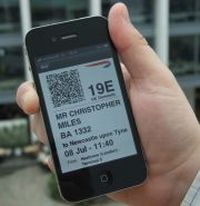 Blackberry users can now take a step into the future and board British Airways flights using the airline’s new Mobile Boarding Passes (MBP). The MBP can be used when customers travel on any British Airways operated domestic flight and to many European destinations.
Blackberry users can now take a step into the future and board British Airways flights using the airline’s new Mobile Boarding Passes (MBP). The MBP can be used when customers travel on any British Airways operated domestic flight and to many European destinations.
Users of Android-operated mobile smartphones will also benefit from the new functionality following its successful launch to iPhone users in July. Over 30,000 customers have used the Mobile Boarding Pass on their iPhones to fly on BA flights since it was introduced.
British Airways was the first airline to develop an App for customers in the UK. The App ensures customers have access to real time flight information about their upcoming trips, full integration with their Executive Club details and easily and smoothly guide customers through each stage of their flight process. It also provides a dedicated travel news section, frequently asked questions and a link to BA's website.
Mobile Boarding Passes can only be used by customers who are members of the British Airways Executive Club but the basic membership is free. www.ba.com/apps
Hong Kong Airlines ready for expansion
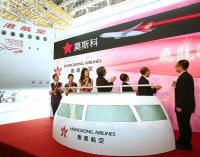 Airbus has confirmed that Hong Kong Airlines, partially owned by the independent Beijing-based carrier Hainan Airways, has finalised a contract with Airbus covering the firm order of ten more A330-200 long range aircraft and converted an existing order for 15 A330s to the A350 XWB.
Airbus has confirmed that Hong Kong Airlines, partially owned by the independent Beijing-based carrier Hainan Airways, has finalised a contract with Airbus covering the firm order of ten more A330-200 long range aircraft and converted an existing order for 15 A330s to the A350 XWB.
Deliveries of the newly ordered A330-200s will begin in 2012, while the carrier's first A350 XWB will arrive in 2018. The aircraft will be operated across a long haul network currently being developed by the airline to link Hong Kong with a wide range of destinations in Europe and North America. To date the airline has taken delivery of two Airbus A330s and in June inaugurated non-stop services to Moscow. www.hkairlines.com
Paris from Shannon
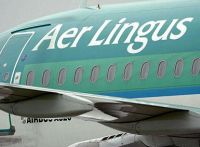 Aer Lingus has confirmed an entirely new three times weekly service between Shannon and Paris Charles de Gaulle, commencing on 17 December 2010.
Aer Lingus has confirmed an entirely new three times weekly service between Shannon and Paris Charles de Gaulle, commencing on 17 December 2010.
The introduction of the Paris route brings to eight the total number of destinations served by Aer Lingus from Shannon Airport, with up to 59 flights per week available on flights to Heathrow, Paris, New York and Boston, and Aer Lingus Regional services to Birmingham, Bristol, Glasgow and Manchester.
Paris offers an alternative connection (to Heathrow) to and from the east. Shannon Airport is the gateway to the west of Ireland, sits on the estuary of that name and is close by Limerick, the country’s third city. Galway is about 40 miles to the north and Killarney around 100 miles south west. www.aerlingus.com
Security conflicts
 Martin Broughton, Chairman of British Airways, gave vent to his feelings regarding airline security when asked a question at the CBI Conference last week. It could not be confirmed but it might be that he, the most senior man at BA, had been put through a frustrating time when recently passing through an airport.
Martin Broughton, Chairman of British Airways, gave vent to his feelings regarding airline security when asked a question at the CBI Conference last week. It could not be confirmed but it might be that he, the most senior man at BA, had been put through a frustrating time when recently passing through an airport.
Mr Broughton said many of the checks were "completely redundant" and added that the UK should stop "kowtowing" to US security demands.
Transport Secretary Philip Hammond quickly signalled his willingness to change the regulations on security checks at British airports. However the rules are not set by Westminster in this case, but by Brussels.
Presently, even in the United States, checks are carried out on a random basis, with the removal of jackets and computers, plus a 100mm limit on liquid containers, opened or unopened. However a serious bomb alert on Friday (29 October) in the freight depot at Britain's East Midlands Airport has again focussed public opinion on security. Mr Broughton's frustrations may have to remain. www.ba.com
Transatlantic venture
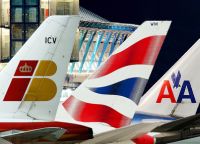 American Airlines, British Airways and Iberia have launched a transatlantic joint venture including new routes, codeshare agreements on over 2,600 services, and the rescheduling of key flights between London and JFK.
American Airlines, British Airways and Iberia have launched a transatlantic joint venture including new routes, codeshare agreements on over 2,600 services, and the rescheduling of key flights between London and JFK.
Members of all three frequent flyer schemes can now earn and redeem miles on eligible routes, and also have the ability to mix and match outbound and return fares from the carriers. For the first time BA and AA will also open their Arrivals lounges at Heathrow T3 and T5 to all oneworld Emerald status cardholders landing on either airlines’ flights.
AA’s CEO Gerard Arpey said that the new schedules, which take effect for the summer 2011 season, would allow for “virtually an hourly service” between London and New York. Schedules between London and Chicago will be similarly adjusted.
The three carriers also announced new routes which “would not be economically viable for a single airline,” namely Heathrow to San Diego with BA, New York JFK to Budapest and Chicago to Helsinki operated by AA, and Madrid to LA with Iberia. The four new routes will start from next April. BA also announced a new twice-a-week year round service from Gatwick to San Juan, Puerto Rico from 28 March 2011. www.ba.com www.aa.com www.iberia.com
World's largest airline gets bigger
 United Continental - Holdings Inc, the world’s largest airline, has announced plans to launch services on several new non-stop routes in 2011 as it begins to optimize the combined route networks of United Airlines and Continental Airlines. Continental, as already noted in AERBT, went to a five times daily service from Heathrow to Newark-New York yesterday.
United Continental - Holdings Inc, the world’s largest airline, has announced plans to launch services on several new non-stop routes in 2011 as it begins to optimize the combined route networks of United Airlines and Continental Airlines. Continental, as already noted in AERBT, went to a five times daily service from Heathrow to Newark-New York yesterday.
Continental will add new flights between Houston and Bakersfield and Palm Springs, California; Cedar Rapids, Iowa; Grand Junction, Colorado; Hobbs, New Mexico; Reno, Nevada, and Montreal (Canada). From Cleveland Hopkins International, Continental will begin services to Cincinnati, Ohio, and from Newark-New York the carrier will begin flights to Des Moines, Iowa.
United plans new service from Washington Dulles to Louisville, Kentucky; Minneapolis/St Paul; Salt Lake City; Tulsa, Oklahoma and Grand Cayman in the Cayman Islands. United will also start new flights from Denver to Amarillo, Dallas Love Field and Lubbock, Texas; from Los Angeles to Austin, Texas and from San Francisco to New Orleans in Louisiana. www.unitedcontinentalholdings.com
ON THE SOAPBOX: Mike Ambrose is the Director General of the European Regions Airline Association (ERA)
Mike Ambrose has led the ERA since 1987. Mike's career began in Flight Operations at British European Airways in 1966. In 1974 he transferred to British Airways' Regional Division where he was responsible for aircraft evaluation and fleet procurement and held other various assignments within the airline.
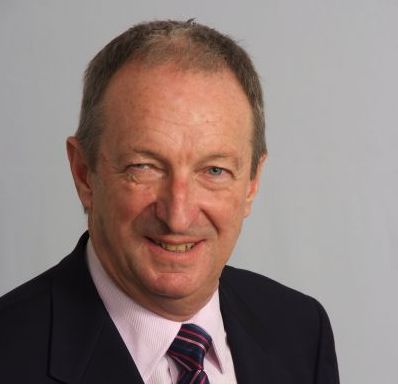 Behind Closed Doors: “To have the right to legislate is not to be right. Industry knowledge and expertise is too often ignored, leading to poor quality legislation that is not fit for purpose.”
Behind Closed Doors: “To have the right to legislate is not to be right. Industry knowledge and expertise is too often ignored, leading to poor quality legislation that is not fit for purpose.”
For a long time now, ERA has advocated the requirement for better regulatory procedures; poor regulation is often the primary cause of unnecessary cost burdens on airlines. With the onset of the financial crisis at the end of 2008, this issue has become even more important for airlines and one of ERA’s top priorities. The European Commission has produced its own excellent principles for good governance which define good practice for use by all regulators and service providers. They are based on business principles and common sense. However, in spite of the blaze of publicity in which these principles are often promoted, in practice they are poorly applied.
The development of the Air Accident Investigation Regulation, soon to become law, is a case in point. An agreement was made between the European Commission, European Parliament and European Council of Ministers behind doors which were effectively closed to all stakeholders. There was no opportunity for consultation and much of the documentation was unavailable for stakeholders to comment on. This method of fast-tracking regulation, known as the ‘Trilogue’ process, is becoming more commonplace, although it is the first time we have experienced it in air transport.
The Regulation could be interpreted to require airlines to fund psychological counselling for all passengers involved in an accident, together with their relatives, with no time limit. Undoubtedly, there will be referrals to the European Court of Justice to obtain a common understanding. So airlines may be burdened with an unlimited liability which is applied to no other mode of transport. If this sounds familiar, then that’s because it is! Ironically, while the Accident Investigation Trilogue process was taking place behind closed doors, airlines were publicly suffering under the unlimited liability for the provision of passenger care imposed on them by Regulation 261/2004 as a result of the Icelandic volcano eruption. Ironically, both the Commission and the EU’s transport ministers suggested this burden should be alleviated, while at the same time agreeing this new law. So, it would seem no lessons have been learned.
Another example of poor application of the European Commission’s “smart regulation” principles is the inclusion of aviation in the EU Emissions Trading Scheme. The EC’s consultants who conducted the impact assessment were not obliged to consult with industry experts. DGENV, the department within the European Commission which is responsible for environmental issues, wrote proposals without sharing their ideas with stakeholders. There was no partnership consultation throughout the process which results in loss of face when changes are proposed by industry stakeholders.
There is a reason why stakeholder consultation is important, and it has little to do with democracy. Industry stakeholders have extensive knowledge and experience of the industry they work in, and as such they are able to provide expert advice on the best workable solution. Although it has happened on occasions in the past, Regulators generally do not deliberately insert detrimental clauses into the laws they make. Harmful elements are more likely to be introduced unwittingly, or simply go unnoticed, because the Regulators do not have the expert knowledge required to realise all the effects of their input. Regrettably, they rarely go unnoticed by the lawyers who are the main benefactors of poor regulation, as they attempt to unravel the Regulators’ tangled rules.
Lack of appropriate consultation is a problem, but it is not the only one. The current regulatory process allows no provision for the ‘final’ legislation to be evaluated before it is adopted. More than 1,100 proposed amendments to the ETS legislation were handled in one day by the European Parliament, none of which was assessed. In the case of Regulation 261 on passenger compensation, this was agreed in the Conciliation process which occurs behind closed doors with no possibility of amendment once the doors are re-opened.
The very fact that a law cannot be agreed upon easily by all parties is a significant clue that it may be unworkable. Changes at all stages of the legislative process must be fully evaluated for both practicality and financial impact, and this must be done with the involvement of experts.
Air transport is a key enabler for social and economic growth, and this is particularly important for the regions of Europe. However, airlines can no longer financially sustain this regime of poor regulation. It is now becoming a question of survival as the industry is becoming less and less attractive to potential investors.
Aviation policy review
 Philip Hammond, UK Secretary of State for Transport, in his first significant speech to the airline industry since his appointment five months ago, has announced an aviation policy review. He said he hoped to publish a draft policy document for formal consultation early in 2012. Full publication is not likely until the end of that year.
Philip Hammond, UK Secretary of State for Transport, in his first significant speech to the airline industry since his appointment five months ago, has announced an aviation policy review. He said he hoped to publish a draft policy document for formal consultation early in 2012. Full publication is not likely until the end of that year.
Mr Hammond was speaking at the Airport Operators Association (AOA) conference. One wit noted that his remarks were straight out of Yes Minister.
The Board of Airline Representatives in the UK (BAR UK) was quick to say it had serious concerns that the planned time scales involved would do nothing to address the urgency of the situation.
At the same time Business Secretary Vince Cable, perhaps more alive to the consequences of the current air travel circumstances, and addressing the CBI, was a little more positive saying that Heathrow “for the time being” was constrained regarding expansion. And to confuse the issue even more Mr Hammond emphasised that the raised APD was a carbon tax, whilst the Prime Minister has said the opposite. (See AERBT 20 August) www.bar-uk.org
Dubai Downtown Radisson Blu
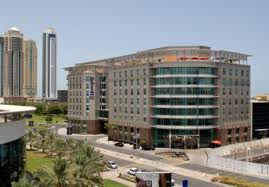 Rezidor Hotel Group has confirmed the Radisson Blu Hotel, Dubai Downtown. The property, featuring 220 rooms, is scheduled to open in early 2011. It is Rezidor’s fourth Radisson Blu Hotel in the Emirate, joining the Radisson Blu Hotel, Dubai Deira Creek, the Radisson Blu Residence, Dubai Marina, and the Radisson Blu Hotel Dubai Media City.
Rezidor Hotel Group has confirmed the Radisson Blu Hotel, Dubai Downtown. The property, featuring 220 rooms, is scheduled to open in early 2011. It is Rezidor’s fourth Radisson Blu Hotel in the Emirate, joining the Radisson Blu Hotel, Dubai Deira Creek, the Radisson Blu Residence, Dubai Marina, and the Radisson Blu Hotel Dubai Media City.
The new hotel will be located on the upper floors of a mixed existing building located within walking distance from Dubai Mall and 10km from the current international airport. It comprises 198 contemporary rooms and 22 suites all equipped with Radisson Blu signature services such as free high-speed internet access. Guests will also benefit from an all day dining-restaurant, a speciality restaurant, a pub, two bars (including a rooftop pool bar), and a Business Class Lounge.
Meeting facilities will include six conference rooms, two board rooms, and a business centre plus a swimming pool and a gym/spa. www.radisson.com
Lisbon base for easyJet
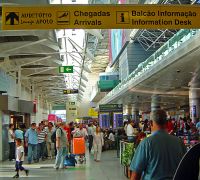 easyJet is to open a base at Lisbon, but not until the winter season 2011. Already the second largest airline in Portugal, the carrier will add to its 15 existing routes to connect the country’s capital city to up to ten new European leisure and business destinations.
easyJet is to open a base at Lisbon, but not until the winter season 2011. Already the second largest airline in Portugal, the carrier will add to its 15 existing routes to connect the country’s capital city to up to ten new European leisure and business destinations.
The base, which will be the home for up to seven Airbus A319 aircraft, will be the airline’s 20th in Europe and enables further expansion, the development of new routes, and the provision of improved service to customers.
Carolyn McCall, easyJet’s Chief Executive, put the operation in perspective by noting that Lisbon already attracts 3.6m tourists and 4m business travellers a year. She said that the airline hoped to contribute one million passengers per year. www.easyjet.com
Phnom Penh to Paris

The flights, which will go via Bangkok, will be initially operated by an Airbus A340-300 equipped with 275 seats (30 in Business, 21 in Premium Voyageur and 224 in Voyageur-Economy). Subsequently for the summer season 2011 the Airbus will be replaced by a Boeing 777-300ER equipped with 309 seats (35 in Business, 24 in Premium Voyageur and 250 in Voyageur-Economy).
Today Cambodia is a left leaning Kingdom with textiles as the major currency earner followed by tourism. www.airfrance.fr
SkyTeam to South America
 Aerolíneas Argentinas, the nationalised flag carrier of Argentina, has signed an agreement to officially start the process of joining SkyTeam as the first South American member of the airline alliance. A target date for 2012 has been set.
Aerolíneas Argentinas, the nationalised flag carrier of Argentina, has signed an agreement to officially start the process of joining SkyTeam as the first South American member of the airline alliance. A target date for 2012 has been set.
Through a five-year restructuring plan introduced last year, Aerolíneas Argentinas is implementing a number of measures to strengthen its business model and establish itself as a major player in the region. Key elements of this plan include fleet renewal and rationalization, adding key international destinations, increasing the density of the domestic and regional network and improving product quality and consistency.
Now in its tenth anniversary year the alliance has welcomed Vietnam Airlines and TAROM as new members. In addition, SkyTeam announced that China Eastern and China Airlines would join the group in 2011, cementing the alliance’s No. 1 position in the Greater China region. SkyTeam says it is actively working on further extending its global network by looking for additional members from regions such as Southeast Asia, India and Latin America. www.aerolineas.com www.skyteam.com
UK airports increase charges
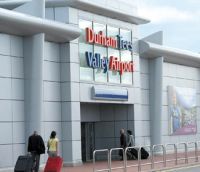 Durham Tees Valley Airport (which used to be known as Teesside) is to introduce a direct passenger handling fee of £6, with a £2 charge for children between the ages of 3 and 15. A similar scheme is already in place at Blackpool, Newquay and Norwich, and Knock and Galway in Ireland. Also announced last week is a £1 drop-off charge at Edinburgh Airport.
Durham Tees Valley Airport (which used to be known as Teesside) is to introduce a direct passenger handling fee of £6, with a £2 charge for children between the ages of 3 and 15. A similar scheme is already in place at Blackpool, Newquay and Norwich, and Knock and Galway in Ireland. Also announced last week is a £1 drop-off charge at Edinburgh Airport.
Durham Tees, is owned 75% by Peel Airports Ltd with the balance in the hands of the local authorities. Peel itself also runs Liverpool and Doncaster airports plus Barton Manchester, recently renamed City Airport. This is an executive and general aviation operation. Peel Airports itself is now owned by the Peel Group plc (35%) with its partner Vancouver Airport Services (65%).
When the tax is introduced shortly passengers will be able to pay at machines in the terminal which will issue tickets enabling them to pass through security and into the departure areas. www.durhamteesvalleyairport.com
ON TOUR: The European regional airlines meet in Barcelona
With Mike Ambrose ON THE SOAPBOX this week we have held back our report on the ERA AGM which took place 22-24 September.
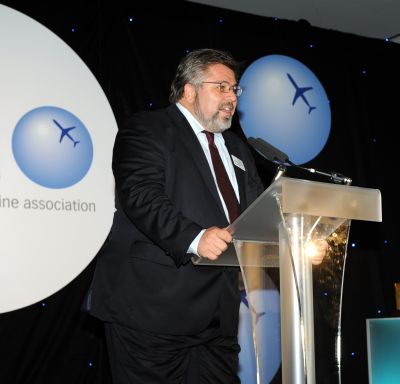 As more than 500 aviation delegates gathered for ERA’s Annual General Assembly at Barcelona’s Catalonia Congress Centre there was a modest but welcome sign of gradual recovery from the global financial crisis.
As more than 500 aviation delegates gathered for ERA’s Annual General Assembly at Barcelona’s Catalonia Congress Centre there was a modest but welcome sign of gradual recovery from the global financial crisis.
However, the cost of meeting the unlimited liability for meals and accommodation of passengers, required by Regulation 261/2004, during the volcanic ash crisis, in addition to the loss of revenue from cancelled flights, has led to significant losses for airlines in certain parts of Europe.
Mike Ambrose said opening the Assembly: “The fall-out from the eruption was not just ash but severe cash difficulties for many airlines, worsening the already difficult position resulting from 2008 and 2009. Politicians and regulators promised assistance to airlines but virtually none has been forthcoming.”
 All things considered the turnout was impressive. 558 delegates, 48 airlines, 13 airports, 67 suppliers and service organisations and 40 exhibitors, record figures. The “rain in Spain” certainly fell but the traditional pre-event golf tournament went ahead as planned and proved a great success.
All things considered the turnout was impressive. 558 delegates, 48 airlines, 13 airports, 67 suppliers and service organisations and 40 exhibitors, record figures. The “rain in Spain” certainly fell but the traditional pre-event golf tournament went ahead as planned and proved a great success.
Delegates attending the Industry Affairs Work Group enthused about the central role the ERA Directorate has taken in tackling passenger rights issues in the European institutions. Operations and Maintenance Work Groups were also held and also had excellent turn-outs, with much to discuss and with a new Work Programme looming for 2011.
Both of these gatherings were prior to the official opening of the Assembly as was an Embraer press briefing, another tradition well attended.
The first working day started with a Media Breakfast sponsored by Sky Work Airlines of Berne (Switzerland), Mike Ambrose making the introductions. "The Media Breakfast has traditionally been an opportunity for member airlines and airports to speak to the media, and to meet each other. This year we're delighted that sponsorship has been taken up by Sky Work – a very smart thing to do as you get to speak to the journalists first."
Mr Ambrose spoke about the year.
 "2010 started quite well for most of our airlines and the start of our Regional Airline Conference (RAC) in Edinburgh (in April) was quite upbeat. Then about 2100hrs on the first day we heard that Mount Eyjafjallajökull had erupted!"
"2010 started quite well for most of our airlines and the start of our Regional Airline Conference (RAC) in Edinburgh (in April) was quite upbeat. Then about 2100hrs on the first day we heard that Mount Eyjafjallajökull had erupted!"
He said that the ensuing situation had "exposed various problems and showed that airlines were unprepared for this.”
He also pointed out that the decision that led to wholesale airspace shutdowns was based on forecasts churned out by a system based on the same software that was used following the Chernobyl nuclear disaster in 1986.
Mike Ambrose also ran through other issues which are dominating the work of ERA at present, such as the proposed new accident investigation Regulation which "fell off the back of a Brussels lorry...we were able to propose amendments but then discovered that it was being fast-tracked behind closed doors. The [European] Parliament and Council rubber stamped it. This is a misuse of a facility that is for emergency situations. So it was signed off without expert input from the industry although some of our initial amendments were incorporated.
Other issues that were of concern, the ERA DG continued, included who was going to pay for the Single European Sky project, EC reviews in key areas such as passenger rights, air transport policy and slot allocation, and one theme that is increasingly running through various issues – that aviation should be treated fairly vis-à-vis other modes of transport.
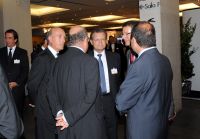 ERA President Antonis Simigdalas (Chief Executive Officer of Olympic Air SA) gave the Board Report, stating first that "this has been a very strange year. Just when we thought everything had happened to us, even more happened – and nobody had thought of a volcano."
ERA President Antonis Simigdalas (Chief Executive Officer of Olympic Air SA) gave the Board Report, stating first that "this has been a very strange year. Just when we thought everything had happened to us, even more happened – and nobody had thought of a volcano."
Simigdalas told the audience that the democratic process in Europe was "seriously flawed."
"Speaking as someone who participated in the design of the whole system before 1992, it has eroded into a club of 27 members each pushing to influence the overall result – which by no means has been optimal." He continued by saying that concern over what might be causing EU disarray "led us to start looking behind the scenes – and the answer [to the EU's current lack of efficiency] is that there are different goals and agendas – and this was very evident during the volcanic ash crisis."
The most recent example, he said, was with the sudden pushing through of the accident investigation regulations. "We thought we were in a position to contribute our expertise," said Simigdalas.
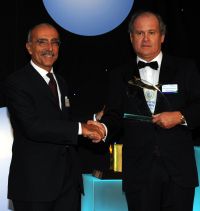 Bertholt Flick, President and CEO of Air Baltic, welcomed panel members Laurie Price, Director of Aviation Strategy at Mott MacDonald; Paul Steele, Executive Director Air Transport Action Group; Malcolm Hart, CEO of Aurigny Air; and Jan Palmer, formerly of Skyways and now CEO of Amapola Flyg. The initial discussion centred on a delegate poll which asked first, are you optimistic or pessimistic about the industry recovery (89% optimistic); and whether the current working methods of the European Commission were appropriate to take air transport forward (No, 83%; Yes, 17%).
Bertholt Flick, President and CEO of Air Baltic, welcomed panel members Laurie Price, Director of Aviation Strategy at Mott MacDonald; Paul Steele, Executive Director Air Transport Action Group; Malcolm Hart, CEO of Aurigny Air; and Jan Palmer, formerly of Skyways and now CEO of Amapola Flyg. The initial discussion centred on a delegate poll which asked first, are you optimistic or pessimistic about the industry recovery (89% optimistic); and whether the current working methods of the European Commission were appropriate to take air transport forward (No, 83%; Yes, 17%).
Malcolm Hart said: "I checked the optimistic button almost by definition but it's an industry that's never made any money from the Wright Brothers onwards. We're poor because people fall in love with aeroplanes and take huge operational risks while others make money. We need some stronger management, particularly in the regional industry – people who will refuse to grow if only others are going to make money after it."
Hart continued: "I'm fed up with coming to ERA [events] and hearing moans about the EC all the time, but if they'd just ask about legislation before creating it things would be much better."
Another key feature of the session was a discussion about the EU Emissions Trading System (EU ETS) with panel members variously commenting that a global industry needed a global solution; that ETS is "the most ineffective way as it takes money out that is needed to improve environmental performance"; that studies in other industries have failed to show that such schemes are effective; that the aviation system is based on a design created for fixed-base emitters of the power generation industry, not mobile emitters; and that methane from "farting cows" is a significant problem (methane having far more climatic impact than CO2) yet farmers receive "huge subsidies".
The next presentation was an excellent overview of passenger rights legislation development in Europe by John Balfour, partner at ERA member law firm Clyde & Co – linking it to the volcanic ash crisis which highlighted more than ever the flaws in EU Regulation 261/2004. He described the European Court of Justice decision in the Sturgeon case as "an appalling judgment where the court rewrote the law by saying that airlines had to give compensation for delays of over three hours." He noted that this is now subject to a reference from the High Court in England & Wales.
Final speaker Brian Flynn gave an overview of the role of Eurocontrol's Central Flow Management Unit (CFMU) Operations Division, which he heads. "It was obvious that the situation was way out of proportion to what had been simulated," noted Flynn. He outlined the various strands of work that were moving forward, five in all – three of which had ICAO involvement. This detailed presentation is available on info@eraa.org
Binter Canarias has been announced the winner of the European Regions Airline Association (ERA) Airline of the Year 2010/11 GOLD Award. The carrier has previously collected three ERA awards, including the ERA GOLD Award in 2005.
New President of ERA is Marc Lamidey, President & CEO, Brit Air.
12 months of body scanning
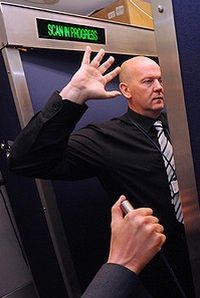 Manchester Airport now has body scanners in use in all its security search areas just 12 months after their provisional introduction. The airport says there has been an overwhelmingly positive reception from passengers.
Manchester Airport now has body scanners in use in all its security search areas just 12 months after their provisional introduction. The airport says there has been an overwhelmingly positive reception from passengers.
Results of extensive passenger surveys following a voluntary trial in Terminal 2 in October 2009 reveals that over 95% of travellers consistently rate the body scanner process to be a significant improvement on the traditional airport security pat down. Passengers are allowed to keep their coats, jackets and shoes on.
Body scanners have also slashed security queues. Replacing personal inspection with this technology has meant a dramatic reduction in the amount of time each passenger spends being security screened. It makes life easier for the staff too.
Within the first four weeks two female Muslim passengers became the first people to be refused travel after they declined to use the body scanner on religious grounds. There have since been no refusals and these passengers have since visited the airport to better understand the privacy controls which they told airport staff has allayed their concerns. www.manchesterairport.co.uk
BA and Iberia profits
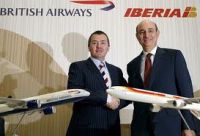 British Airways and Iberia, the two companies that will make up International Airlines Group, both made profits during the last quarter, a turnaround in each case.
British Airways and Iberia, the two companies that will make up International Airlines Group, both made profits during the last quarter, a turnaround in each case.
With BA the figure was £158m (2009 £292m) whilst Iberia came up with €53 (2009 loss €182m).
BA will not pay a dividend this quarter but passenger revenue was up by 7.9% and capacity down by 6.2%. Revenue in cargo increased by a dramatic 39.4%, driven by yields recovering from the market low point of last year. The airline noted that by year end 12 aircraft will have been fitted with the new First cabin. The initial two Boeing 777-300ER aircraft – with revamped cabins and in-flight entertainment – are now in operation with the third scheduled to enter service next month.
In overall terms, Iberia came up with an improved load factor (85.6%) and a 4.3% growth in average earnings per RPK, which was due to the increase in the number of Business Plus (long haul) passengers. In the long haul segment the Spanish airline raised its capacity by 9.5% in the quarter, giving a load factor higher than 88%. Cargo, once again, was a star performer with an increase of 32.4%. www.ba.com www.iberia.com
Emirates via Aberdeen
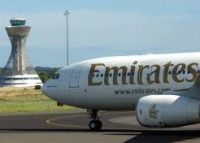 Aberdeen-based travellers (and those inbound) now have an alternative to the Middle East and beyond following the signing of an agreement between Emirates Airline and Eastern Airways linking Aberdeen and Newcastle.
Aberdeen-based travellers (and those inbound) now have an alternative to the Middle East and beyond following the signing of an agreement between Emirates Airline and Eastern Airways linking Aberdeen and Newcastle.
Aberdeen is Eastern Airways’ largest base with services to 15 destinations, while Newcastle is also a key hub for the UK airline. All passengers travelling with Eastern Airways are able to use the dedicated fast track security channels when departing from Aberdeen and Newcastle airports.
Eastern Airways’ 11:00 departure (T3 4035) from Aberdeen arrives in Newcastle at 11:55, where it connects with Emirates’ daily flight to Dubai (EK 036) at 13:10. The Emirates service from Dubai (EK 035) arrives at Newcastle at 11:40, connecting with the return Eastern Airways service to Aberdeen (T3 4036) which departs at 13:30.
Emirates services are operated by an Airbus A330 aircraft with a choice of Business and Economy Class. All passengers flying from Aberdeen are invited to use the Eastern Airways Business Lounge at Aberdeen. www.easternairways.com
New Hotels to open in Moscow, Kazan and Yaroslavl
 Hilton Worldwide is to open three new hotels at strategic regional locations in Russia.
Hilton Worldwide is to open three new hotels at strategic regional locations in Russia.
The new properties will open in Yaroslavl and Kazan, as well as Hilton Worldwide's second hotel in Moscow. These new signings will significantly expand the group's presence in Russia, with 11 hotels now open or under development.
The Doubletree by Hilton, Moscow Leningradsky-Riverside – will offer 270 rooms. The hotel is expected to open in the beginning of 2012. A yacht club and marina is located next to the hotel site.
At Yaroslavl, a UNESCO world heritage site, the Hilton Garden Inn is planned with 179 guestrooms close by the Moscovsky railway station and the main city highway, which connects Yaroslavl to Moscow (250 km). It is expected to open in spring 2012.
The new build Hilton Garden Inn Kazan is not expected to be ready until 2014 and will have 171 guestrooms. The property will be located in the downtown area of the city, close to the airport and Volga river port. Historic Kazan is the capital of Tatarstan, recognised as a sovereign state by the Russian Federation, with a population of more than one million inhabitants. www.hilton.com
Ryanair abandons Marseille and cuts Frankfurt
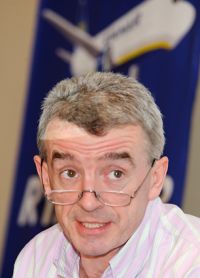 Marseille Airport is to lose Ryanair after the Irish airline stood its ground and refused to bow to pressure regarding its work practices. In what was seen as a final move on some sort of reconciliation CEO Michael O’Leary went to the French port city to make the announcement. The base with its four aircraft will close on 11 January.
Marseille Airport is to lose Ryanair after the Irish airline stood its ground and refused to bow to pressure regarding its work practices. In what was seen as a final move on some sort of reconciliation CEO Michael O’Leary went to the French port city to make the announcement. The base with its four aircraft will close on 11 January.
The airline says that the operation and its flight crews fully comply with the European Directive on transport workers which allows all mobile staff to pay income tax and social insurance in the country they work (which in this case is Ireland because they work on Irish registered aircraft which is defined as Irish territory) or where their employer is resident and where they are physically paid, which also in Ryanair’s case is Ireland. The French authorities take a different view and claim that these mobile (Irish) workers should pay income tax and social insurance in France, rather than in Ireland, even though this is contrary to EU regulations.
Ryanair will continue to operate ten routes to/from Marseille Airport, on aircraft and crews that are based elsewhere.
The airline is also cutting a claimed 30% of flights at Hahn next year citing the new German passenger tax. www.rynair.com
Stuttgart gets Middle East flights
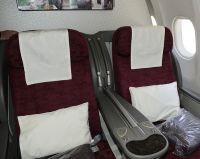 Qatar Airways is to launch a thrice weekly service between Stuttgart and Doha commencing on 9 March next year. It will be the first non-stop direct flights from the Gulf area to what is the centre of Germany’s motor industry.
Qatar Airways is to launch a thrice weekly service between Stuttgart and Doha commencing on 9 March next year. It will be the first non-stop direct flights from the Gulf area to what is the centre of Germany’s motor industry.
Due to licensing requirements no other carrier from the UAE can offer the service.
However Qatar Airways is being cautious with the introduction and will initially offer the service only three times per week using an Airbus A319 with eight Business and 102 Economy Class seats. Flights are timed to offer Doha connections with destinations in the Gulf and typically Hong Kong, Melbourne, Tokyo and Singapore. www.qatarairways.com
Victoria station car hire
 Avis UK has opened a branch at London Victoria train station. As part of the company’s ongoing expansion across the UK, this new facility will provide a convenient onward travel option for those visiting the capital.
Avis UK has opened a branch at London Victoria train station. As part of the company’s ongoing expansion across the UK, this new facility will provide a convenient onward travel option for those visiting the capital.
As one of London’s busiest transport hubs, bringing together both the mainline train terminal (with non-stop rail services to Gatwick), the Underground and the coach station, Victoria is a key gateway to the capital for visitors from outside the city. Direct bus services also serve Gatwick, Heathrow, Luton and Stansted airports.
In addition to the Victoria train station branch opening and as part of Avis it has also relocated its Mayfair branch to the Marriott Hotel at Marble Arch. Customers living/staying/working in and around London Victoria and Marble Arch can have their hire car delivered and picked up from their doorstep for just £10 each way. www.avis.co.uk
HAPPY TALK: Another "blonde" story
On a recent trip there was the inevitable blonde (and predictably an American).
After a morning on the rocky foreshore of an Iguana teeming Ecuadorian Galapagos island it was time to go back to our ship, via tender.
“I’ve lost my sunglasses”, the lady exclaimed!
Her backpack was thoroughly searched and the women herself.
There was no alternative but to minutely explore every inch of our path on the island bearing in mind it is illegal to dispose of any litter on the Galapagos.
Nothing after a very painstaking hunt.
Did the sunglasses turn up?
The answer is yes.
It seems that the lady concerned was actually wearing the spectacles all the time. They were just lost in her mountain of long blond hair.


